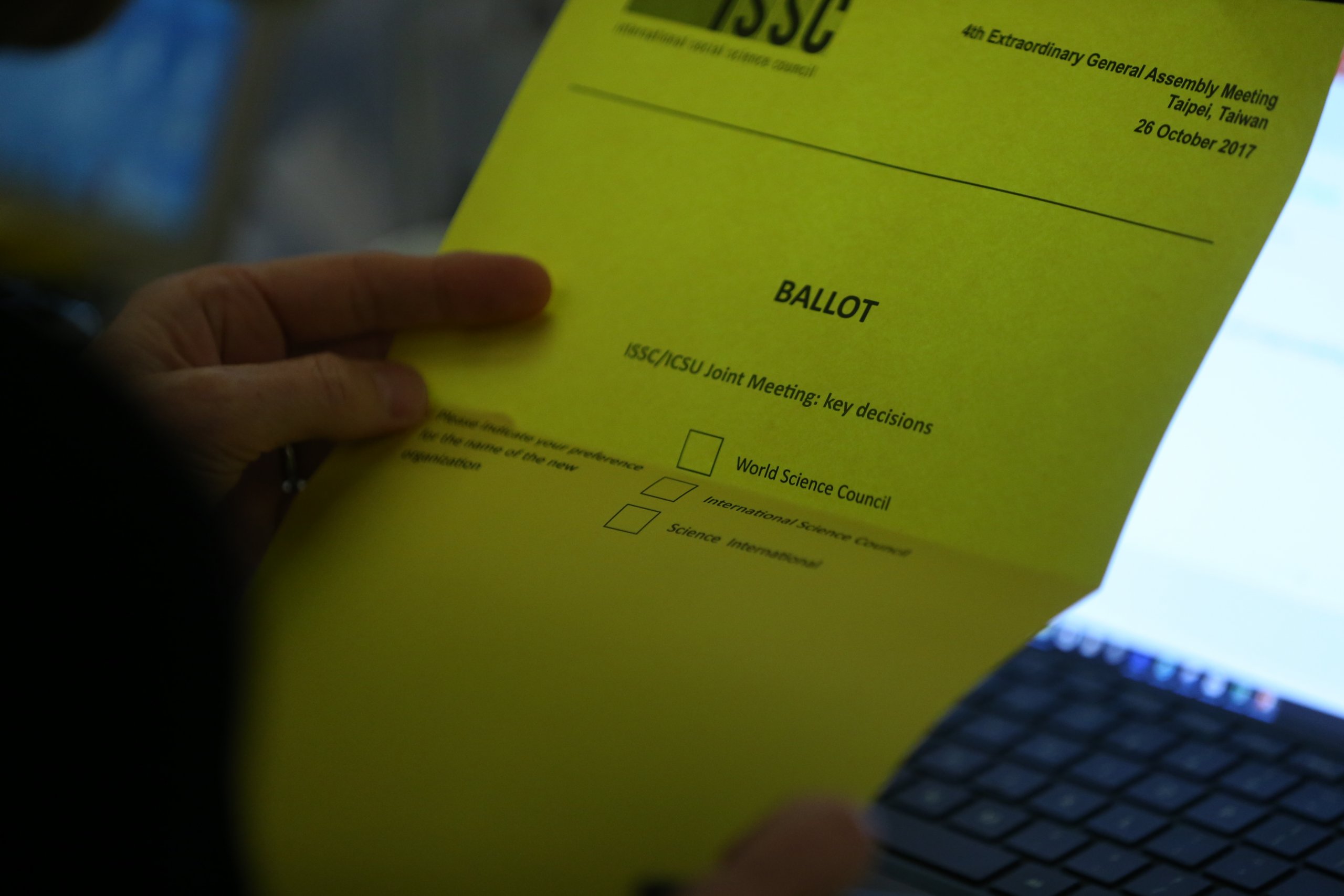Learn more about the how and the what’s next of the historic vote in Taipei on October 26, 2017 to create the International Science Council by merging the world’s leading bodies representing the natural and social sciences.

From October 25-26, members of the International Council for Science (ICSU) and the International Social Science Council (ISSC) gathered for a Joint Meeting to vote on the proposed merger of the two organisations. Over the two days of intense discussions, members wrangled over and debated a number of contentious issues, notably on membership categories and voting procedures. At the end of the second day, members voted overwhelmingly (ICSU 97.6%, ISSC 90%) to merge and form the International Science Council in 2018.
Members were asked to accept the new organizational strategy and financial proposals as well as to agree on issues of statutes, governance, and voting procedures. The votes were –in order taken- the following:
Approve the Draft High-Level Strategy
Agree on proposal for development of a new dues structure
Agree on the Draft Statutes for Rules of Procedure
Reconfirm the addendum under Statute Article 19
Approve the Prospective Joint Annual Budget
Note the progress made in designing a new Paris-based secretariat for the merged organization
Agree on the legal mechanism of merger by absorption to achieve the merger
Agree that the merger will come into force on the founding General Assembly
Vote for or against the merger
Vote for the preferred name of the new organization from the Proposals for the name for the new organization
Note the steps included in the Proposed Roadmap towards implementation and launch of the new organization
Vote on the date and pace of the first General Assembly
Agree that the election board of the Elections Committee and the process for establishing the Governing Board should be conducted in accordance with the new Statutes and Rules of Procedure
For more information on the background to these decisions, please consult this link.
On the first day the high-level strategy and proposal to mandate the new governing board to develop a new dues structure were unanimously approved. There was a more prolonged debate on membership categories and voting, which was extended into the second day.
In cases where there are several members in one country, or region, there was debate on whether a principle of “one member, one vote” should apply and whether different principles should apply for scientific, governance and financial issues.
Based on those discussions, members were presented with three modified categories on Day 2:
1) Member unions and associations, being international scientific bodies devoted to scientific activities (e.g. across a discipline);
2) Member organizations, being academies of science, research councils or analogous not-for-profit bodies
3) Affiliated members, being others.
These 3 categories were approved by a broad consensus.
Members also agreed on a differentiated system of voting that allows for three types of procedure. For scientific matters, each member will get one vote. For elections and procedural matters, each member will get one vote, except when there are several members from the same place, in which case they should agree among themselves or, in cases where agreement can’t be reached, they will each be given a proportion of the vote.
Furthermore, it was agreed that in some cases the General Assembly can agree exceptions. Given the inherent challenges of defining regions, the GA was empowered by the Membership to make the final decision on a case by case basis on the addition of any new member. Each Member Union or Association will have a weighted vote equal to the total number of country votes divided by the total number of member unions and associations, within the total membership base.
Members highlighted the ambition of the new strategy, and stressed that to meet that ambition would require a significant change in new sources of external funding. Many also highlighted the importance of dedicating increased resources to outreach and communications.
The vote on Thursday paves the way for a legal implementation phase to establish the new organization. Members will be asked to endorse the merger by electronic vote in the second quarter of 2018. The Founding General Assembly will take place in France, in the second half of 2018 and will include an International Science Summit.